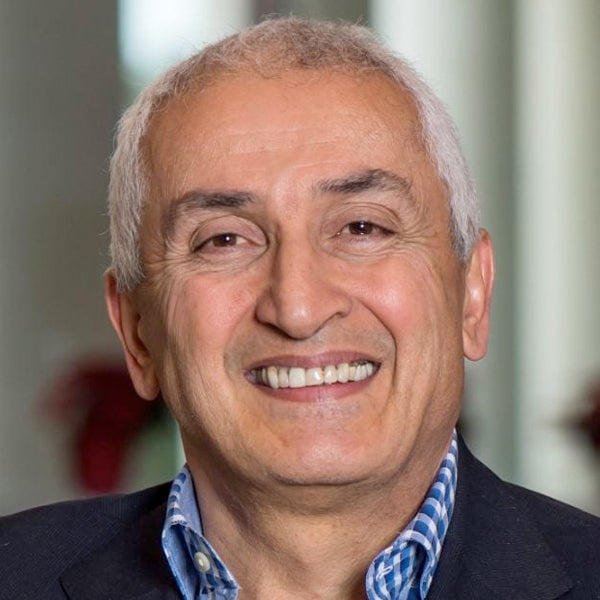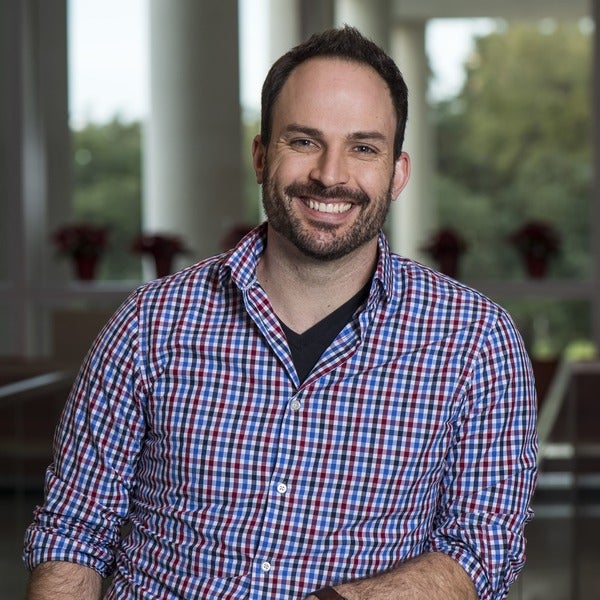The leadership team of the Rice Brain Institute unites innovators across neuroscience, engineering, ethics, and policy to advance how we understand and care for the human brain. Their collective expertise drives a bold, interdisciplinary vision—where discovery meets real-world impact.
Together, they are shaping a future where brain health fuels creativity, resilience, and connection—transforming lives through science, technology, and collaboration.
Our Leadership Team

Director of the Rice Brain Institute, and Co-Director of the Neuroengineering Initiative
Biographies
Behnaam Aazhang is a Fellow of IEEE and AAAS, and a distinguished lecturer of IEEE Communication Society. As the J.S. Abercrombie Professor in the Department of Electrical and Computer Engineering and Director of the Center for Neuroengineering Initiative, Dr. Aazhang’s interests are signal and data processing, information theory, dynamical systems, and their applications to neuro-engineering with focus areas in (i) understanding neuronal circuits connectivity and the impact of learning on connectivity (ii) developing minimally invasive and non-invasive real-time closed-loop stimulation of neuronal systems to mitigate disorders such as epilepsy, Parkinson, depression, obesity, and mild traumatic brain injury (iii) developing a patient-specific multisite wireless monitoring and pacing system with temporal and spatial precision to restore the healthy function of a diseased heart, (iv) developing algorithms to detect, predict, and prevent security breaches in cloud computing and storage systems.
Harris A. Eyre, MBBS, Ph.D. is a physician, neuroscientist, entrepreneur, and strategist. He is widely credited for pioneering the brain economy transition and is dedicated to fostering awareness, data, tools, investment, and leadership to drive the transition. To do this, he works sectors and industries. Eyre is the Harry Z. Yan and Weiman Gao Senior Fellow for Brain Health and Society and senior advisor for neuroscience at Rice University's Office of Innovation. He is also a Baker Institute Rice Faculty Scholar and is adjunct with Rice's Neuroengineering Initiative and Psychological Sciences. He is a Senior Fellow for the Brain Economy with The University of Texas Medical Branch. He is a visiting senior fellow at the Wharton Neuroscience Initiative, a senior advisor with McKinsey and Company, and advisor at MD Anderson's Cancer Neuroscience Program. Eyre is an alumnus of the Forbes 30 Under 30 and the Fulbright Scholar program. He has garnered recognition with the EB1A Green Card, an honor typically reserved for Nobel and Pulitzer prize winners. He has authored over 200 papers and chapters in outlets such as Nature Medicine, The Lancet Neurology, Neuron, World Psychiatry, The Brookings Institution, and was the lead editor of the book 'Convergence Brain Health' (Oxford Press).
Simon Fischer-Baum is an Associate Professor of Psychological Sciences at Rice University, the director of the T.L.L. Temple Foundation Neuroplasticity Laboratory, who is currently on leave from Rice co-directing the Perception, Action, and Cognition program in the Social, Behavioral, and Economic Sciences Directorate at the National Science Foundation. His research focuses on understanding literacy in the brain, both how we read and how we write, using a wide range of experimental methods – computational modeling, behavioral studies and brain-imaging techniques (e.g., fMRI, ERP/EEGs, intracranial recording) – and study a variety of populations – unimpaired undergraduate, individuals with developmental differences like congenital deafness or blindness, those with cognitive impairments following brain damage – all with the goal of understanding human capacities in ways that can inform interventions and policy that can improve people’s lives. He is a recipient of the Charles Duncan Award for Outstanding Academic Achievement and a George Brown Award for Superior Teaching, has been named a “Rising Star” by the Association for Psychological Sciences and is the recipient of an NSF CAREER Award.
Jacob Robinson is a Professor in Electrical & Computer Engineering and Bioengineering at Rice University, where his group develops miniature technologies to manipulate and monitor physiology and neural circuit activity. Dr. Robinson is the co-founder and CEO of Motif Neurotech, which is developing a therapeutic brain computer interface to treat mental health disorders. Professor Robinson has supervised over 30 current and former Ph.D. students and more than 40 undergraduate researchers since joining Rice in 2012. He has published over 70 peer-reviewed journal articles including articles in Nature, Science, Nature Nanotechnology, Nature Materials, and Nature Biomedical Engineering, has won best paper awards at ACM MobiCom and IEEE CICC, and has given multiple keynote presentations. He is a recipient of the Charles Duncan Award for Outstanding Academic Achievement, a DARPA YFA award, the Materials Today Rising Star Award, the Hamill Innovation Award, and a John S. Dunn Collaborative Research Award. He is a former co-chair of the IEEE Brain Initiative and is currently a senior member of IEEE and member of the IEEE EMBS AdCom.
Dr. Rosa Uribe is an Associate Professor of BioSciences, a CPRIT Scholar in Cancer Research, and Editor-in-Chief of the journal Differentiation. Dr. Uribe leads the Laboratory of Neural Crest and Enteric Nervous System Development, combining live zebrafish imaging, single-cell omics, CRISPR gene editing, computational biology, and spatial gene expression analysis to study neurodevelopment. Her fundamental research has implications for enteric neuropathies, including Hirschsprung disease; neural crest–derived cancers, particularly neuroblastoma; and neurodevelopmental and neurodegenerative disorders affecting gut-brain communication. Dr. Uribe was recruited to join Rice University through a CPRIT award in 2017. She is a recipient of the John S. Dunn Collaborative Research Award and the NSF CAREER Award and is deeply involved in mentoring students and shaping the next generation of scientists.
Prof Wittung Stafshede recently joined Rice University as Professor of Chemistry and BioSciences, the Charles W. Duncan Jr.- Welch Chair in Chemistry, and a CPRIT Scholar in Cancer Research. Her research group uses biophysical and biochemical tools to study (dys)functional properties of proteins and biological pathways at the molecular level, with the aim of advancing fundamental knowledge to improve human health. The lab focuses specifically on copper-binding proteins linked to cancer and on misfolded proteins in neurodegenerative diseases, often with a central theme of cross-reactivity between different biomolecules. Wittung-Stafshede was elected to the Royal Swedish Academy of Sciences in 2016 and to the Royal Swedish Academy of Engineering Sciences in 2020. She became an Honorary Fellow of the Royal Society of Chemistry and was elected to the European Academy of Sciences and the Finnish Society of Sciences and Letters in 2024. She has received numerous awards and distinctions, including the Arrhenius Medal, the IUPAC Distinguished Women in Chemistry and Chemical Engineering Award, and recognition as a Fellow of the Biophysical Society. She serves on the Nobel Prize in Chemistry Committee since 2020 and as a member of the Scientific Council for the Lindau Nobel Laureate Meetings since 2021. For more than a decade, she has contributed to the Biophysical Society in various leadership roles.




